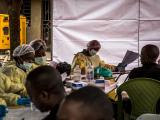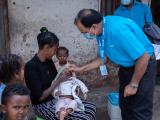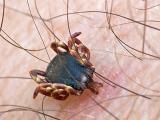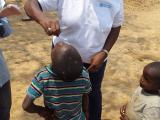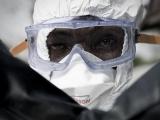Jul 20, 2010
DoD awards contracts to develop defenses against Ebola, Marburg
The US Department of Defense (DoD) recently awarded contracts potentially worth more than $400 million to two companies to develop defenses against the deadly Ebola and Marburg virus infections. AVI BioPharma, based in Bothell, Wash., announced that it won a contract worth up to $291 million for advanced development of its vaccines against Ebola and Marburg. The contract is structured into four segments, with the first segment worth about $80 million, and DoD will have the option to proceed to the next segment after each one is completed, the company reported. If DoD exercises all the options, the contract will cover all development and testing needed to obtain Food and Drug Administration (FDA) approval of the two vaccines. Under an earlier contract, AVI completed development steps that led to the filing of investigational new drug applications for the vaccines.
Jul 16 AVI BioPharma press release
The other DoD contract was awarded to Tekmira Pharmaceuticals, Vancouver, B.C., for development of an RNA interference, or "gene silencing," drug to treat Ebola fever, the company announced. The initial phase of the contact is worth $34.7 million over 3 years and covers preclinical development and a phase 1 clinical trial. DoD will have the option to extend the contract through further clinical testing and FDA approval, for a total project cost of up to $140 million. Tekmira's drug involves a technology called stable nucleic acid-lipid particle. More than 15% of the value of the contract will be awarded to US companies, the firm said. In May, Tekmira published a study, supported by an earlier DoD contract, in which all monkeys treated with the drug survived exposure to the Zaire strain of Ebola virus. A securities analyst quoted in a recent Canadian Press story said the study impressed DoD and led to the contract for further development.
Rising pertussis cases broaden California's call for booster shots
With a pertussis epidemic poised to become California's worst in 50 years, state health officials yesterday expanded recommendations for the tetanus, diphtheria, and pertussis (Tdap) vaccine. In a statement, the California Department of Public Health (CDPH) said it recommends an adolescent-adult Tdap booster vaccine for anyone age 7 or older who is not fully immunized, including those over age 64, as well as for women of childbearing age before, during, or after pregnancy and for those who have contact with pregnant women or infants. So far this year California has confirmed nearly 1,500 pertussis cases, a fivefold increase from the same time last year and up from 910 cases the state reported in mid June. About 700 more cases are under investigation. Five babies, all under 3 months, have died from the disease. State officials are offering free postpartum Tdap vaccination at hospitals, have developed bilingual educational materials for the public, and have teamed up with the Centers for Disease Control and Prevention (CDC) to investigate the epidemic in the particularly hard-hit Central Valley.
Jul 19 CDPH press release
WHO warns of Angola polio threat
The World Health Organization (WHO) warned yesterday that an ongoing polio outbreak in Angola is expanding and presenting a high-risk threat to neighboring countries. In a statement yesterday the WHO said 15 cases of wild polio virus type 1 (WPV1) have been detected in the country's capital, Luanda, or in provinces that were previously declared polio-free. One genetically related case was recently found in an area of the Democratic Republic of Congo that borders Angola. The WPV1 outbreak has persisted in the country since 2007. Angola has conducted three rounds of polio vaccination this year, with more immunization campaigns planned for early August and September. The WHO characterized the need for children to be vaccinated against the disease as urgent, pointing out that supplementary immunization activities miss as many as 25% of children. It also urged central African countries to increase surveillance for acute flaccid paralysis.
Jul 19 WHO statement
